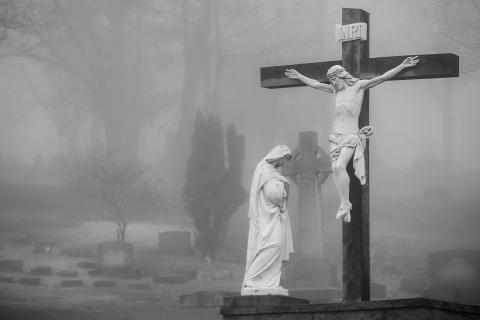
Immigration has become an increasingly hot-button political issue in both Europe and America, with election cycles spinning around the topic and Pope Francis, even, weighing in with a recent comment on the urgency of the Christian obligation to treat migrants with compassion and justice.
It’s a big topic, one that requires a lot of expertise and careful thought when it comes to making specific policy decisions. But there are some general principles worth spelling out in respect to it, too, which Christians can reliably keep in view when it comes to their own thoughts and conversations on the topic.
We might point to at least three. The first is a basic orientation to charity toward people who are in genuine need. Our brothers and sisters are always meant to be treated with dignity and fraternity, love and fairness, regardless of where they’re coming from. Then, on another hand – a hand that doesn’t undermine or work against the point of charity – is a concern for maintaining a basic political order. Any society needs to be able to maintain a reasonable structure in terms of who it’s governing and serving, as that structure is its point of bedrock stability for sustaining the common good.
A third principle – and it’s one that probably raises the most questions – is the good of preserving a sense of culture. This is not an absolute value, for Christians: all cultures have some aspects that are good and some that are less good (or even definitely evil), which need to be baptized and challenged by the Gospel. But cultures are natural and vital parts of human life together, generally speaking. They provide a collective sense of identity and fellow-feeling that allows for various human things to be sorted out – things that have to do with family and civic life and ecclesial life. So to be flippant or dismissive in respect to the preservation or genuine development of a culture is to find oneself on shaky ground. It’s to leave a common life somewhat naked, without those handholds that tend to sustain a sense of mutual obligation, goodwill, and resilience.
As the polarization of political discourse becomes more and more endemic to these sorts of issues, principles like these tend to be singularly grasped onto with a white-knuckle grip, to the exclusion of all others. But a Christian mind is meant to hold them each and all in view, weighing the goods of a stable political order and cultural identity, for instance, within the context of a fundamental concern for charity. How all such considerations hold together in the midst of specific policy decisions is, again, a question that needs to be dealt with on an ad hoc basis. But principles are helpful, and maintaining a stay against the polarization of one against another is helpful, as well, especially amidst the complex human realities that a Christian mind is ever called upon to consider and bring the Gospel to, too.
Another attack on a church in northern France is keeping European Christians on edge.
As social unrest continues in Venezuela, the ruling socialist regime has declared the start of Venezuela's Christmas season to be October 1 this year, drawing a response from local Christian authorities.
A new report concludes that 56,000 people have lost their lives in the last four years due to ethnic and religious violence in Nigeria.
Pope Francis has begun his Oceania trip in Indonesia, using his visit to the country with the world's largest Muslim population to call for greater Catholic-Muslim dialogue and underline the need for the continued preservation of human rights for people of all faiths.
Finally, if you've been waiting for a sign that it's time for you to read Brideshead Revisited, here it is.


